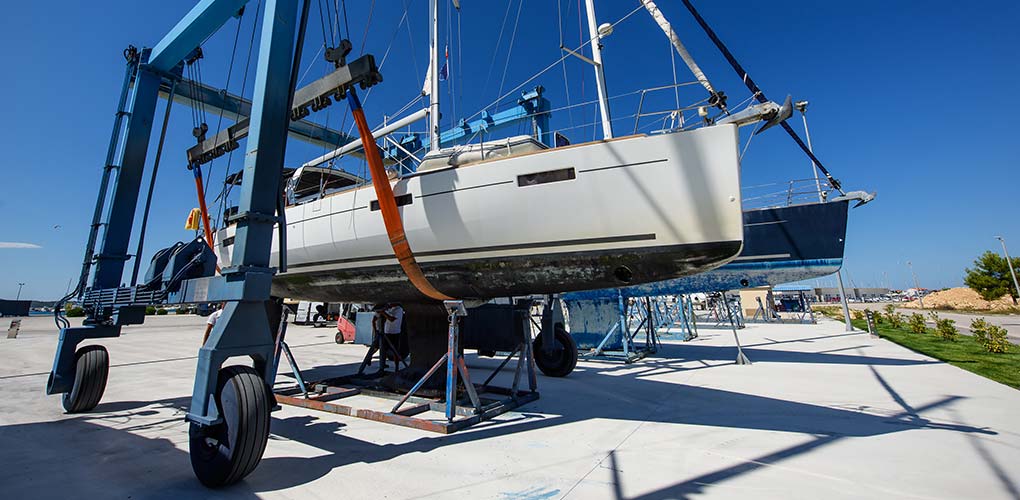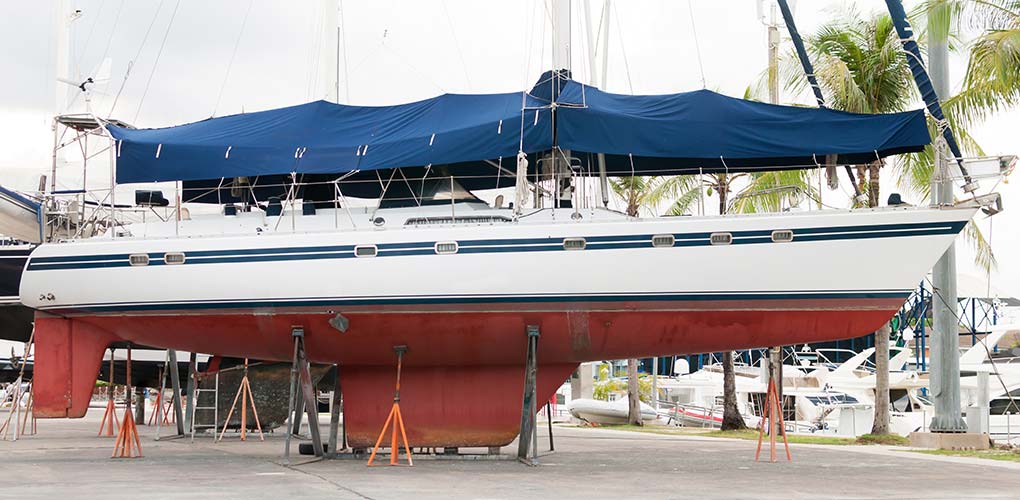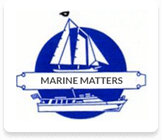
Pre-purchase/Condition Reports For Commercial and Recreational Vessels
- Pre-purchase Reports
- Condition Reports for Insurance
- Condition Reports for Commercially Registered Vessels
- Maintenance and Safety ‘To Do’ Lists
Pre-purchase Reports
Marine surveyors are only able to visually inspect the accessible areas of the vessel but most surveyors also use a small hammer to sound the structure, and moisture meters to check for relative moisture levels in FRP composite and timber structures, weather permitting. Infra-red thermal imaging cameras can also be used to detect moisture in these materials. Specialists can non-destructively test (NDT) metal materials for thickness, and welds can be x-rayed, or tested for cracks and porosity with liquid dye penetrene. Engines can be checked using oil analysis kits. Some purchasers also obtain separate reports from other specialists such as engine technicians, marine accredited electricians, and mast, spars, and rigging manufacturers.
Marine Matters’ surveyors discuss the purchaser’s requirements and expectations of the vessel before the inspection. The broker or seller is asked to provide details of the vessel, and, if possible, prepare the vessel for the inspection using the Marine Matters pre-inspection wish list. They also arrange for the vessel to be lifted from the water for a minimum time depending on the size, age and construction of the vessel, and supported on the hard stand high enough for the surveyor to inspect the bottom of the hull and the keel. The hull is cleaned off using high pressure water. The broker or seller also returns the vessel to the mooring or berth after the inspection. The surveyors will not operate any equipment on the vessel but will need to witness the operation if required.


The marine surveyor will look for structural defects, any defects that may represent an added cost to the purchaser, and any safety risks. Generally on the day of the inspection, an in-water inspection is conducted first, followed by an out-of-water inspection, and sometimes a short sea trial, depending on the findings at each stage, and the purchaser’s decisions. Photographs and notes are taken and a written report provided if required.
The written report will list any defects or safety concerns that were noted and a copy of all the photographs will be saved to USB Flash Drives and provided to the purchaser. Vessels built for recreational use currently only have minimum safety requirements so the surveyor will use his own standards for the inspection. ‘
Vessels built for commercial use within Australia have to be built and maintained to a recognised standard (usually the National DCV Law) so these vessels need to be inspected by an AMSA accredited marine surveyor. A pre-purchase report on a commercial vessel will include an assessment of the vessel’s compliance with the AMSA Certificate of Survey standard, or the AMSA Certificate of Operation standard.
Condition Reports for Insurance
Most marinas now insist that vessels carry insurance and most insurance companies have a list of preferred marine surveyors who are able to do these reports. Most Insurance companies also provide a template for the inspection report. Marine Matters’ reports are accepted by all the current marine insurers operating in Australia and although we use their templates for our Insurance reports, the procedure we use is similar to a pre-purchase inspection but the emphasis is more on safety. Pre-purchase reports are generally not used for Insurance purposes unless the vessel is in very good condition and has no safety issues.
Condition Reports for Commercially Registered Vessels
Refer to DOMESTIC COMMERCIAL VESSELS.
Maintenance and Safety ‘To Do’ Lists
Marine Matters’ surveyors are able to provide a list for maintenance jobs, and a list for safety equipment, for owners and operators of vessels.
OUR SERVICES
Condition Reports
Marine surveyors are only able to visually inspect the accessible areas of the vessel but most surveyors also use a small hammer to sound the structure, and moisture meters to check for relative moisture levels in FRP composite and timber structures, weather permitting. Infra-red thermal imaging cameras can also be used to detect moisture in these materials. Specialists can non-destructively test (NDT) metal materials for thickness, and welds can be x-rayed, or tested for cracks and porosity with liquid dye penetrene. Engines can be checked using oil analysis kits. Some purchasers also obtain separate reports from other specialists such as engine technicians, marine accredited electricians, and mast, spars, and rigging manufacturers...
Domestic Commercial Vessels
Domestic Commercial Vessel registration is very complex and changes are often made so this information should be used as a guide only. The Australian Maritime Safety Authority web site, in the section titled ‘Domestic Commercial Vessels’, has many excellent Guidance Notices for vessel owners and operators regarding the Certificate of Survey and the Certificate of Operation, and also has copies of all the AMSA Forms that need to be submitted for these Certificates, or for the annual renewal of these Certificates...
Valuations
Marine Matters provides financial institutions, liquidators, Australian customs, insurers, divorcing couples, and accountants with vessel valuations. They request valuations such as ‘Market Value’, Auction or Forced Sale Value’, ‘Agreed Value’, and values before and after marine incidents.
There are published guides for values of smaller, popular, production line vessels but there is no published data base of sale prices for most vessels sold in Australia. Listed asking prices for boats for sale on websites are generally higher than the actual selling prices and the listings are difficult to compare unless they include an extensive description of the vessels for sale...
Consultancy
Clients, who are having a vessel constructed, or their finance companies, are able to consult with Marine Matters and the builders to develop a plan for payments at mutually acceptable stages of the construction. When a payment is due, a Marine Matters’ surveyor checks the construction to ensure the stage has been completed. Compliance with the specifications and the construction standards, as well as the quality of the construction, may also be included in the report if required...
Other Inspections
New Build Progress Reports
Banks and other lenders appoint marine surveyors to certify that a vessel has reached the stage of construction required for a Progress Payment. Marine Matters is accepted by most Australian Financial Institutions for this type of inspection.
Maintenance, and Scope of Work, Lists
Marine Matters surveyors are able to prepare a ‘Scope of Work’ list, for repairs or maintenance, which can be used to obtain quotes for the repairs or maintenance. Some vessel owners have this done before they put their vessel on the market.

